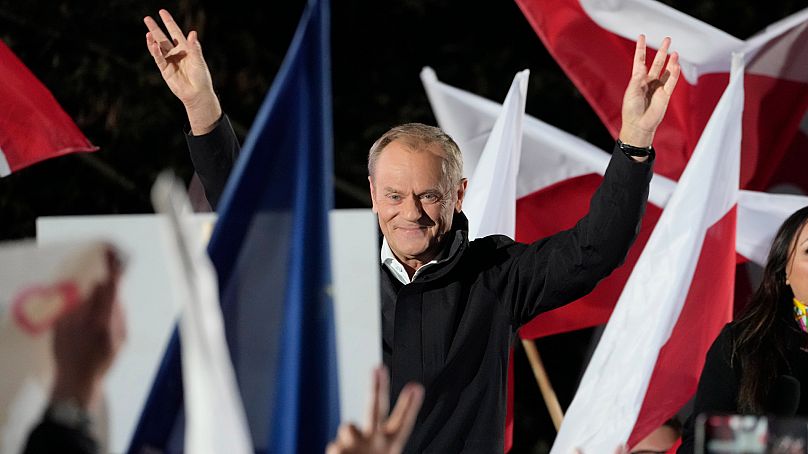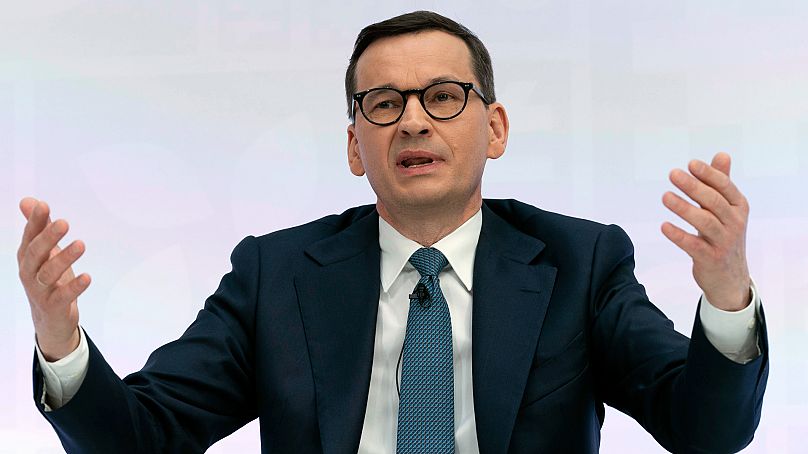Poland’s election will determine if the ruling conservative Law and Justice party will remain in power and continue its eurosceptic policies.
 ADVERTISEMENT
ADVERTISEMENT
Poland is heading to the polls on Sunday to vote in its parliamentary elections that will not only decide the country's political direction but will have a major impact on the security and politics of the wider region.
But recent surveys suggest that around 45% of voters are still undecided.
"There are people who are planning to vote but they are not sure who they are voting for or they think they might still change their mind as well as that are not planning to vote," Katarzyna Wodniak, a social policy expert at Trinity College Dublin, told Euronews.
"There are slightly more women than men in this group, and research shows that women are generally more pro-democracy, and more progressive, if they decided to vote, that could mean that their votes could swing the elections."
According to Katarzyna Rozenfeld, who is part of the “Women to the Polls” campaign, "At the top of this list of why women do not vote the answer is that I do not believe that my vote matters. Other answers are that we do not have trust in politicians, and we do not believe in politics."
This could play a major role in the future of the country, as the vote on Sunday will decide whether the ruling conservative Law and Justice party will be given an unprecedented third term and continue its Euro-sceptic policies or whether the opposition forces will come to power.
Law and Justice is leading in the polls with around 35% support, yet it is at risk of losing its majority in parliament. Its nearest rival, the Civic Coalition led by Donald Tusk, is just a few points behind but has gained momentum lately.
The government's election campaign has been built around discrediting Tusk, a former prime minister and former top European Union figure.
Tusk recently moved his centrist alliance to the left, courting women and younger voters. Civic Platform has traditionally taken a fairly conservative position on abortion.
But after a near-total ban was imposed under Law and Justice, Tusk vowed to liberalize the abortion law and has threatened to ban party members who criticize his plan from running in the election.
His appearance in a debate broadcast live on pro-government TVP on Sunday gave Tusk a chance to reach out to government supporters.
The debate featuring leaders of six parties and coalitions running in the Sunday election was dominated by Tusk and Prime Minister Mateusz Morawiecki as each tried to cast the other — and his policies — in a bad light.
The debate centred around topics including migration, retirement age and social benefits, unemployment, state assets and security.
The Civic Coalition and two other opposition groups together have greater support than the ruling party, but they are weakened by not running together. Small swings in the performance of the smaller parties could shift the final result.
Since the Law and Justice party won power in 2015, it has used TVP as a mouthpiece to praise its own policies and people and vilify the opposition, most notably Tusk.
In the debate, Tusk and his allies accuse Kaczynski of eroding the democratic foundations of the country by taking control of the judiciary branch and public media and putting the country on a path that could lead out of the European Union.
Law and Justice insists it has no intention of leaving the EU. It is running on promises to continue its social policies and to safeguard the country's security after building a high wall on the border with Belarus to keep out migrants.












